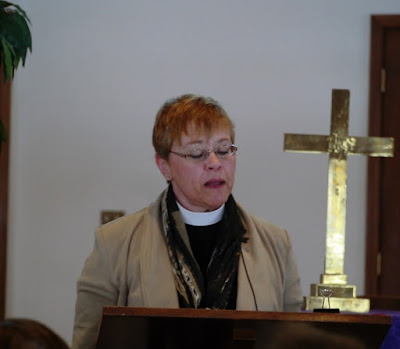What does justice for God's creation look like? The Rev. Kris Bjerke-Ullman, pastor of St. Timothy Lutheran Church, gave some ideas at the fourth of five Lenten luncheons, which was held on March 14th.
What does it mean to subdue the earth and to have dominion of what God has entrusted to us?
"We have to be good stewards of what God has entrusted to us. We are caretakers of God's creation. We must support biodiversity. There are lives in the grass." There are lives in ponds and in bodies of water and in the woods. In a pond, we find a variety of species, including mosquitoes, frogs, fish, and birds.
"We have to serve and keep the Earth for the good of all."
Do people always get it?
"It is hard to care for the things that are not ours and to have dominion over every living thing. Do we own it and control and do it our way? We do not have special privileges to destroy and dominate."
“We don’t always allow biodiversity to happen, and we make changes
in the environment.”
What kind of changes do we make to the environment?
One of the
changes that people have made in the environment is to plant invasive species,
such as European buckthorn and purple loosestrife. “European buckthorn looks
like a lush sea of green with pretty berries but it is low in protein and high
in carbohydrates. It is bad to eat and can kill smaller birds.” It grows
rapidly and reduces biodiversity by shading out native shrubs and plants,
Pastor Kris said. There is also the risk of soil erosion into nearby bodies
of water, she said. Purple loosestrife is “beautiful, invasive, and
destructive.” It is an invasive plant species that “suppresses growth of native
species and replaces marshland meadow species. It reverses biodiversity.”
What can we do to restore God's creation in our community?
- Dig up and restore invasive plant species, such as purple loosestrife and European buckthorn.
- "Stop mowing to the water's edge" if you have property with riparian rights to creeks or the river. The creeks in Grand Island are tributaries of the Niagara River. Anything that ends up in the creeks will eventually find its way to the Niagara River. "Leave an unmowed buffer zone. Fifty feet is adequate.” Native plant species in the unmowed areas, which could include such plants as spotted Joe Pye weed, New England Aster, and blue flag iris, will capture impurities before they go into a creek.
- Don't use lawn chemicals, especially if you are still mowing to the water's edge. The lawn chemicals could leach into a creek and, eventually, into the Niagara River.
- Get educated about your local environment. Look for workshops and training classes that are offered to provide environmental information. Pastor Kris also said that she plans on setting up workshops “to talk about a healthy and diverse environment.” The workshops would be designed for both children and adults.
The last week of
the Lenten luncheon series is scheduled for noon on March 21 and will feature
the Rev. Carla Kline of Island Presbyterian Church, who will discuss “Justice for
Immigrants.”



5 comments:
Thee are fabulous tips for encouraging biodiversity, thanks for sharing Alice. Regardles of my personal beliefs in God or not, I wholeheartedly agree that we need to take responsibility as stewards of the planet, and make sure our presence and actions here is preserving and not destroying.
Interesting suggestions, thank you.I gave a talk on Women's World Day of Prayer last Friday where the theme was "And God saw everything He created was very good!" The talks had to be based on Genesis 1. When I did research, I was horrified to learn some of the things we are doing to our planet by our use of plastics! Improve your Life, Improve your Mind
I am not sure if we have riparian rights, but we do have property that goes down to the edge of a creek, with a steep, unusable (for development) slope. We've owned our house for over 30 years and maintain that in a natural state. I wish others would do the same - from time to time people walking along the creek dump garbage, and I would not risk injury trying to collect it. It's shameful. I loved this sermon.
Interesting idea to leave a fallow stretch by the water.
We do what we can. No fertilizing or chemicals on our lawn. We do keep it trimmed. We have rain barrels to catch water for the garden, solar panels for electricity though not quite enough.
Lily
Post a Comment